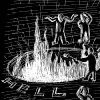Contracts are promises made between two or more parties that the law will enforce. Three things legally establish a contract:
1. A promise or offer made by one party;
2. Acceptance of it by the other;
3. Adequate compensation given by one to the other.
The compensation (“I will give you this”) must be at least of comparable value to the goods provided or the service done (“if you do that”). Or at least the values must fairly seem that way to the parties entering the contract.
We’ve all entered contracts in one form or another, from renting an apartment to buying a car. They safeguard our interests and give us legal grounds to stand on in case there is a breach of contract. But what compensation is so great that anyone would make a contract resulting in his death? What lure or what consideration could be so great that one would die for it? Of course, the first time this happened, the offer wasn’t presented that way. And it still isn’t. Wouldn’t it take the world’s greatest salesman to get someone to sign a contract which promised his death?
The Contract with Death
The first contract with death was made at the dawn of mankind’s existence, in Genesis 3. Just look at what was promised to Eve (“I will give you this”) if she would only do what she was told (“if you do that”). All she had to do was eat of the tree of knowledge of good and evil. If she did, she was promised three things:
Her eyes would be opened;
She would become like God;
She would know good and evil.
To sweeten the deal, she was even told she would not die. It was true that her husband, Adam, had told her that she would die if she ate from that tree. But, what was death, anyway? She’d never seen it. She yielded to the persuasive voice of the Serpent, disobeying the voice of her husband. All these things, she thought, would now be hers.
Immediately she knew something was wrong. She’d been lied to, that was clear, but what could she say? She hadn’t listened to her husband. What could she do now? She brought the contract to Adam and then, what could he do? Watch her be expelled from the Garden and die? He signed on the dotted line, just as she had, disobeying God as well by eating the fruit after her. They were in it together now.
Immediately the accusations and justifications started flying as fear took its grip on their souls. So it was that the great and terrible history of mankind began, having as its foundation the same fear that Adam and Eve first experienced that day — the fear of death.
How each man and woman responded to that fear would determine his or her eternal destiny. Would they do what was right, or listen to that other voice (which is so sensitive to our evil desires and comes so quickly to us), as Adam and Eve did? No longer could Satan tell them, “You won’t die,” for that deception was now exposed.
Everyone dies, and then what? That is where the evil one has directed his lies since the Garden — and many have listened to him. Deep into men’s souls he whispers, “There will be no consequences if you gratify that desire, hurt that person, steal that thing, tell that lie… There’s no judgment awaiting you after this life. There’s only one life and one death, and after that… nothing. Go ahead and do whatever feels good. Everything is ultimately meaningless, anyway.”
Those who accept such lies make themselves unworthy of eternal life. To their own private sins they add the harm they do to others that cannot be repaired in this life. Yet there are those who don’t listen to the lies of the evil one, but instead tenaciously keep listening to the voice of conscience. They hold onto the most essential aspect of their human nature — the image of God in which all men are made.
Sadly, in their freedom, not all men retain that image. In the end, each one bears the image of the one he continually listens to — either Satan or God. They bear either image to the extent that their capacity and situation in life allows them to. And then, having arrived at their destiny, they must dwell there, with the one whose image they bear, for all eternity. God is just, showing partiality to no man, but judging each one on the basis of his deeds. And not only judging, but rewarding those who honor His voice within their soul (i.e., their conscience) with eternal life!
In spite of thousands of years of erroneous Christian teaching, there is no fixed contract with the second death, which is unending. The contract is only to the first death for wrongdoing done by each individual. That death ends in the rewards and punishments which Paul carefully describes in Romans 2.
The righteous judgment of God, who “will render to each one according to his deeds” — eternal life to those who by patient continuance in doing good seek for glory, honor, and immortality; but to those who are self-seeking and do not obey the truth, but obey unrighteousness — indignation and wrath, tribulation and anguish, on every soul of man who does evil, of the Jew first and also of the Greek; but glory, honor, and peace to everyone who works what is good, to the Jew first and also to the Greek.
(Romans 2:5b-10)
This struggle between good and evil is the lot of all men. It is the nature and weighty significance of this thing called life — these few short years we live and breathe. This struggle continues all of a man’s days, without letting up, until each person sets his character in one direction or the other — towards good or towards evil. Each man crystallizes his character by his “patient continuance in doing good” — or evil. This happens over the course of a lifetime as his thoughts express themselves in his words, his words take concrete form in his actions, and his actions shape and then set his character. The final result is fixed, unalterable, and utterly personal. Each person determines his final, ultimate destiny by his choices in this life. There is no unfairness with God or partiality towards any. All men have a conscience they can obey or dismiss, but each course has an unalterable destiny.
That is, unless they are presented with the most amazing offer any man has ever faced since the Garden — the nullification of the contract with Satan, into which they have been born. That contract inevitably results in their death, for the wages of sin is death. Remember, dying is a process, but death is a condition, a place where one receives his wages. The Savior of mankind spoke very clearly of this place in the Gospel According to Luke. He spoke of the just desserts of a good and a bad man in Luke 16:19-31. The rich man’s words from the grave are the stark reality of those who disregard their conscience for the comforts and pleasures of this life:
In Hades, where he was being tormented, he looked up and saw Abraham far away with Lazarus by his side… And he said, “Then I beg you, father, to send him to my father’s house — for I have five brothers — that he may warn them, so that they will not also come into this place of torment.”
(Luke 16:23,27,28)
It was the torments of conscience, the gnawing accusations against himself and his self-centered conduct in life that he could not by any means silence in death. They burned him like a fire. While in death, Lazarus did not experience the same torments as the rich man. He waited in hope, a son of Israel, for the Savior’s death to set him free with Abraham. He had the same hope as all do in death who lived “doing good, seeking for glory, honor, and immortality.” They were able to pay for their own sins in death (for all have sinned). Then, at the last judgment, God will reward them with eternal life according to Paul’s gospel, and the Savior’s, too.
For it is not the hearers of the law who are righteous in God’s sight, but the doers of the law who will be justified. When Gentiles, who do not possess the law, do instinctively what the law requires, these, though not having the law, are a law to themselves. They show that what the law requires is written on their hearts, to which their own conscience also bears witness; and their conflicting thoughts will accuse or perhaps excuse them on the day when, according to my gospel, God, through Jesus Christ, will judge the secret thoughts of all.
(Romans 2:13-16)
Do not marvel at this; for the hour is coming in which all who are in the graves will hear His voice and come forth — those who have done good, to the resurrection of life, and those who have done evil, to the resurrection of condemnation.
(John 5:28-29)
There was one man who was not born into this contract, nor did he ever sign up, although the “recruiter” came persistently to Him to do so. And what an enlistment bonus He was offered!
Again, the devil took Him up on an exceedingly high mountain, and showed Him all the kingdoms of the world and their glory. And he said to Him, “All these things I will give You if You will fall down and worship me.”
(Matthew 4:8-9)
By the purity of His life this man was able to be something for us that we could never find in ourselves or anyone else. He was able to be our ransom, paying the full price necessary to redeem us from the power of sin and death. By so doing, He broke the contract with Satan forever for all those who would believe in Him. Just as in Jerusalem when the gospel was proclaimed at Pentecost, all those who believe in Him live together and share all things in common. Neither the gospel nor its fruit has ever changed.
Renewing the Contract
You might wonder how it is that we, the sons of Adam and daughters of Eve, came to be party to the contract with death. We were not present with our parents in the Garden of Eden. We did not personally make that first contract with Satan, the old deceiver, and bring death upon the human race. Adam made it for us, but we were “in Adam’s loins,” so to speak, when he signed up. Yet soon enough, we added our signature in the very same way, by ignoring the same voice inside us — our conscience. It is the voice of God within each man or woman, steadily warning us not to do what we know is wrong and approving us when we do what is right.
To go against that voice within us just one time is to personally renew the contract Adam and Eve made. Each time we go against our conscience, it not only makes us guilty, but gives freer and freer reign to all of our evil inclinations. Although all men sin, not all men give into the great pressure to sin in greater and greater ways. To resist that pressure is a great thing, of which the Creator takes special note. But to annul the contract we have made with Satan can only be done in two ways.
If we are not presented with either of these ways, then our deeds in this life, which are recorded in the “books” of our conscience, follow us to the judgment. There, on the basis of our persistence in doing what is right or wrong, we will be rewarded with the second life or the second death. But what if we came face to face with the opportunity to nullify this terrible contract?
Annulling the Contract
Annulling or nullifying a contract counteracts it completely. It makes it void or of no effect. Being presented with the opportunity to annul one’s contract with death is a rare and wonderful event. In fact, meeting the terms of this annulment results in an epic transfer from one sphere of authority to another. And all the more ominous and chilling is the reality that regardless of whether its terms are received or rejected, an eternal transfer takes place. Spiritually, one is never the same again.
The First Way
The first way to void the contract with death is by wholehearted belief in the Savior, Yahshua, who died for us:
Most assuredly, I say to you, he who hears My word and believes in Him who sent Me has everlasting life, and shall not come into judgment, but has passed from death into life.
(John 5:24)
Yet, the possibility of deception is so great in this life, and the spiritual enemy of mankind, a master of deceit, is so persuasive, especially in matters of religion, that there must be a way to know, for certain, that one’s contract with death has been broken. Paul the Apostle warned the Corinthians that some of them may have “believed” in vain. And the gospels record a number of instances where men claimed to believe in Messiah, but He did not believe in them. The evidence that can be verified, both by oneself and others, that one’s contract with death has been broken, is found in 1 John:
We know that we have passed from death to life, because we love the brethren. He who does not love his brother abides in death.
Whoever hates his brother is a murderer, and you know that no murderer has eternal life abiding in him.
By this we know love, because He laid down His life for us. And we also ought to lay down our lives for the brethren.
(1 John 3:14-16)
Those who love their brothers in the way 1 John 3 speaks of, and who keep the commandments of Messiah, are the ones who truly believe in Him. Those who do not love their brothers abide in death and so prove themselves still worthy of the death sentence. In this case, the Apostle John says their hatred is equivalent to murder — and no murderer has eternal life. But those who love their brothers in the wholehearted fashion seen in Acts 2 and 4 are the ones who can have legitimate confidence that their first death sentence has been annulled.
There, in the Community of the Redeemed, they can have the hope of coming into complete obedience to Messiah’s words, which is the only confidence anyone can have of never tasting death:
Most assuredly, I say to you, if anyone keeps My word he shall never see death.
(Jn 8:51)
This is the only exception in which the seal of death over a man or woman has been broken. An exception is a case in which a law or rule no longer applies. Therefore the conviction is annulled and the sentence is taken away. And keeping His word is only possible for those who are compelled by the love of Messiah in all they do. They no longer live for themselves, but only for Messiah.
For the love of Christ compels us, because we judge thus: that if One died for all, then all died; and He died for all, that those who live should live no longer for themselves, but for Him who died for them and rose again.
(2 Cor 5:14-15)
This kind of man or woman is free to serve Messiah where He is, which after His death, resurrection, and ascension into heaven, is in the community of believers on earth. There, all those who hate their life in this world can join together to follow and serve Him.
He who loves his life will lose it, and he who hates his life in this world will keep it for eternal life. If anyone serves Me, let him follow Me; and where I am, there My servant will be also. If anyone serves Me, him My Father will honor.
(John 12:25-26)
Redemption — the Price Paid to Break the Contract
Apart from the belief that surrenders all to Messiah, the case against every man is “iron-clad.” This belief leads one to willingly obey His word, including giving up all one’s own possessions, something which is only possible in true community.
Otherwise, the sentence, upon conviction, is the first death, no matter how well a man has lived his life. And there he abides, in death, until the resurrection, to be judged worthy of life or condemnation.
Do not marvel at this; for the hour is coming in which all who are in the graves will hear His voice and come forth — those who have done good, to the resurrection of life, and those who have done evil, to the resurrection of condemnation.
(John 5:28-29)
Ironclad means unbreakable by the individual, overwhelming in the quality of evidence to be presented against him. The only acceptable way to void that terrible contract is to make a covenant with the Redeemer. Yahshua’s death in our place satisfies the demand of justice that we must die for our own sins. The one who pays that price redeems those, and only those, who make a covenant with Him. Their half of the covenant is to no longer live for themselves, but for Him who died and rose again on their behalf. To redeem is to re-purchase, free from captivity, retrieve, regain, and rescue. It is to void the contract with death, which we voluntarily entered into by our own sin, by voluntarily believing, trusting, and obeying the One who saved us.
To redeem is to recover what was otherwise beyond retrieval and make greater than before. In the New Testament the word redeem never refers to the recovery of isolated individuals, but is always used in the context of the corporate redemption of a people for God’s own possession.
The Compact with Messiah
A covenant with Messiah is a compact, entered into with others in full agreement of the terms, like the signers of the Mayflower Compact. Just as those first Pilgrims did, believers join together, pledging their obedience to the good commands of their Savior. The terms of salvation are to give up one’s life and all one has, does, and is, in order to deliberately follow the Son. Those who believe do this because they have been redeemed, and so are zealous for good deeds:
Who gave Himself for us, that He might redeem us from every lawless deed and purify for Himself His own special people, zealous for good works.
(Titus 2:14)
Their contract with sin and death was thus broken by Messiah giving himself as a ransom for their lives, paying the price by suffering in death for them. Thus, believers may be said to be purchased, bought at a great price, and therefore are slaves to the One who bought them.
Those who do not act like His slaves, obeying His words and honoring Him in all they do, simply prove that they were not included in the purchase price. Their name is not on the deed of those purchased by the blood of the Lamb. They have not become part of the compact, the willing agreement between two or more parties, made by connecting or combining the two together.
In Messiah, the men and women in each community were closely and firmly united together. Paul defined this compact for the believers in Ephesus by reminding them of their lives before they believed.
At that time you were without Christ, being aliens from the commonwealth of Israel and strangers from the covenants of promise, having no hope and without God in the world.
(Ephesians 2:12)
For us who believe, the only possible response to His giving all for our sake, withholding nothing, is that we give all we have in like manner. Nothing else is compatible with Him. Nothing else makes us worthy of Him. This belief in one’s heart results in fellowship and communion with Him and also with all those who believe.
The Second Way Out of the Contract
The second way out of the contract is to reject the good news, even as Messiah told Nicodemus:
He who believes in Him is not judged; he who does not believe has been judged already, because he has not believed in the name of the only begotten Son of God.
(John 3:18)
This causes one to avoid the first death sentence altogether — by going directly to the second death in the lake of fire, for such a one is “judged already.” There is no need for such a one to be judged according to his deeds, for he is among the “cowardly and unbelieving” — the worst class of sinners listed in the Book of Revelation:
But for the cowardly and unbelieving and abominable and murderers and immoral persons and sorcerers and idolaters and all liars, their part will be in the lake that burns with fire and brimstone, which is the second death.
(Revelation 21:8)
This is the destiny of someone who hears and rejects the true gospel, made clear to him by a true disciple, because he is unwilling to do the will of the Father.
So, please do not be unwilling, dear reader, but come, as we once did, to find out whether you are willing to do His will, which you can only ever know among those who are already doing it. Don’t be among the cowardly who faint for fear of losing their own life, and who end up forfeiting eternal life.
Then Jesus said to His disciples, “If anyone wishes to come after Me, let him deny himself, and take up his cross, and follow Me. For whoever wishes to save his life shall lose it; but whoever loses his life for My sake shall find it. For what will a man be profited, if he gains the whole world, and forfeits his soul?
Or what will a man give in exchange for his soul?
(Matthew 16:24-26)





